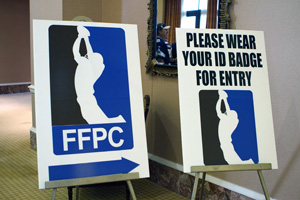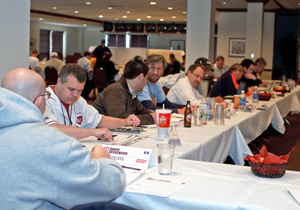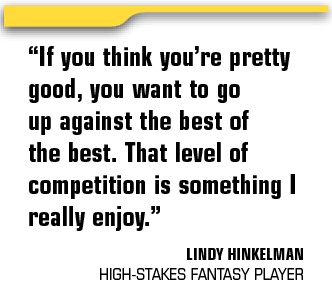The scene has been described by fantasy players as simply intoxicating.
A Las Vegas ballroom. Music pumping. Endless food and drink available on demand. Attractive local models posting player picks in ultra-competitive fantasy leagues. Top prizes extending well into six figures. Boasting and trash talk rising to epic levels.
“There’s such an adrenaline rush,” said Stacie Stern, general manager of Arizona-based Head2Head Sports. “The excitement and anticipation that surrounds all of this is really big. And so many
 |
The Fantasy Football Players Championship had more than 3,000 registered teams last season.
Photo by: Fantasy Football Players Championship |
people involved say it’s one of their best days of the year, that the live fantasy experience is really unlike anything else.”
Such is the atmosphere surrounding high-stakes fantasy sports, a small but fast-growing segment of the multibillion-dollar industry.
More than 32 million people in the U.S. and Canada play fantasy sports, according to the most recent data available from the Fantasy Sports Trade Association, the vast majority of them participating in some sort of free or low-fee league. But a sliver of that market, perhaps less than 10,000 people, play in high-stakes leagues that typically carry entry fees of more than $1,000 per player.
It is these leagues where the most intense and accomplished fantasy players go to get their competitive juices flowing.
“If you think you’re pretty good, you want to go up against the best of the best,” said Lindy Hinkelman, an Idaho pig farmer who has won more than $300,000 in the last three years playing high-stakes fantasy baseball. “That level of competition is something I really enjoy.”
Several companies operating in the high-stakes fantasy business are looking to expand their profiles and take advantage of that keen player interest. The National Fantasy Baseball Championships and National Fantasy Football Championships, majority owned by sports data powerhouse Stats LLC following an early 2011 purchase, each have since generated company-record registrations during their most recent seasons. Leagues there cost as much as $10,000 per team to play, and the combined operation has grown to about $4 million in annual revenue.
Similarly, the New York-based Fantasy Football Players Championship saw its number of registered teams nearly double last fall from the previous season to more than 3,000. Industry veteran Emil Kadlec, owner of Fantasy Sports Publications Inc. in New Mexico, is preparing a return to the high-stakes space this coming football season with the creation of Full Time Fantasy, running a series of games with a top prize of $200,000. Others including Stern’s Head2Head Sports, which operates at somewhat lower price levels, are replicating the Las Vegas draft party experience in other cities, including a long-running event in Dallas in partnership with ESPN Radio.
And various entities, including the National Fantasy Baseball Championships and National Fantasy Football Championships, are exploring how to expand the media profile of high-stakes fantasy, including potential new radio, television and online video ventures.
Though fantasy sports executives are loath to make any comparisons between their industry and gambling, the aspiration here is to make the live events of high-stakes leagues a media content play similar to televised poker. Aside from
occasional one-off specials on regional sports networks, local radio and outlets such as the NBC Sports Network (formerly known as Versus), high-stakes fantasy has had no major mainstream media presence.
“You can see the potential of our live draft results and how that content could be valuable to any mass market medium, whether that’s radio, online or hopefully one day TV,” said Greg Ambrosius, National Fantasy Baseball Championship and National Fantasy Football Championship founder, and general manager of fantasy for Stats LLC.
But the varied initiatives still arrive against a troubled backdrop. The largest high-stakes fantasy operator, the Missouri-based World Championships of Fantasy Football, filed for Chapter 7 bankruptcy in November after failing to pay more than $1 million in player prizes, and generating more than $4 million in losses.
 |
High-stakes operations benefit from a player base that often enters multiple leagues.
Photo by: Fantasy Football Players Championship |
The collapse of the World Championships, stemming primarily from poor cost controls and an aggressive expansion campaign that was grossly undercapitalized, represented a prominent black eye from which the industry is still recovering. The saga was the subject last fall of an ESPN “Outside The Lines” segment. And several lawsuits are pending against the World Championships, including one from the Missouri attorney general’s office.
“The WCOFF demise was perhaps the biggest black eye in the history of fantasy sports,” said Paul Charchian, Fantasy Sports Trade Association president. “We fortunately haven’t had a lot of scandal in this industry, but there was obviously this one, and sadly, it was actually quite avoidable. It was a bad business plan poorly executed. And it’s caused a lot of collateral damage, and damaged the trust level of some players.”
Low margins, loyal players
For all the spectacle and intensity surrounding high-stakes fantasy, it’s actually a rather low-margin business, providing in many instances a far smaller profit percentage than traditional online fantasy leagues operated at scale.
Most high-stakes leagues pay out at least 80 percent of total player entry fees, leaving the remainder to fund company operations. Some can even exceed 90 percent in payouts to winning players.
One particular example is the National Fantasy Football Championships’ exclusive Diamond League for fantasy football. Carrying a $10,000 entry fee, the 12-team league pays a $60,000 top prize, plus additional bonuses for winning the regular-season portion of the campaign. Total prize payouts in the league amount to $114,000 out of the $120,000 in collected entry fees. The Diamond League for the National Fantasy Baseball Championships, similarly, pays $140,000 in prizes out of $150,000 in collected entry fees.
By comparison, low-cost, fee-based leagues by larger operators can carry a profit margin well in excess of 30 percent.
“It’s definitely a different model than the large companies running leagues at scale,” Ambrosius said.
 |
High-stakes leagues such as the National Fantasy Baseball Championships pay out more than 80 percent of the player entry fees they receive.
Photo by: National Fantasy Baseball Championships |
Advertising is an additional revenue component for some leagues. But given the small scale of high-stakes fantasy to date, corporate spending is not a significant budget item.
But many high-stakes operations remain profitable, due to lean business operations, and perhaps most important, a highly loyal and recurring base of players with many playing in multiple leagues. Operators described annual drafts in fantasy football and baseball as akin to a family reunion.
“The core of high-stakes players have definitely become sort of like a family,” said Kadlec, who helped found World Championships before selling it in 2007, prior to the company’s financial ruin. “There’s the fun of playing itself, to be certain. But a lot of what people also enjoy is getting together each year, seeing how everybody is doing and reconnecting.”
Players come from all walks of life, ranging from high-end professionals to self-described professional gamblers and more unusual backgrounds such as Hinkelman. But they generally are male, between 25 and 60 years old, and boast incomes in excess of $100,000 per year.
| Turnkey Sports Poll |
| The following are results of the Turnkey Sports Poll taken in January. The survey covered more than 1,100 senior-level sports industry executives spanning professional and college sports. |
|
|
| What are your expectations for the revenue generated by the fantasy sports industry over the next five years? Will it: |
| Grow substantially |
29% |
| Grow slightly |
57% |
| Stay flat |
9% |
| Not sure / No response |
5% |
|
|
| Should sports websites offering fantasy sports (e.g.: Yahoo!, ESPN, etc.) have to compensate players for using their likenesses? |
| Yes |
32% |
| No |
62% |
| Not sure / No response |
6% |
|
|
| In which of the following leagues do you manage a fantasy team? (Select all that apply) |
| NFL |
41% |
| MLB |
14% |
| NBA |
6% |
| NASCAR |
6% |
| NHL |
4% |
| MLS |
1% |
| None of the above |
53% |
|
|
Which of the following do you
like better? |
| Participating in an NCAA March Madness bracket contest |
51% |
| Playing NFL Fantasy Football |
27% |
| N/A -- I don't participate in either |
19% |
| Not sure / No response |
3% |
|
|
| Source: Turnkey Sports & Entertainment in conjunction with SportsBusiness Journal. Turnkey Intelligence specializes in research, measurement and lead generation for brands and properties. Visit www.turnkeyse.com. |
The low margins and diminished scale of high-stakes fantasy have kept Yahoo! Sports, ESPN and CBS Sports, the three most dominant companies in fantasy sports, essentially on the sidelines.
CBS Sports has the largest profile among the major operators in paid fantasy leagues, with 60 percent of its leagues carrying some type of entry fee. It offers fantasy football leagues with entry fees as high as $500 and top prizes of $3,500. But executives there said they have no plans to expand significantly this segment of the business.
“We’re looking for games that can attract millions of people,” said Jason Kint, CBSSports.com senior vice president and general manager. “We’re really focused on the commissioner-style products, and what people are essentially paying for with us is a software fee, the hosting of the leagues, live scoring and so forth.”
Industry standards
In the wake of the World Championships collapse, the Fantasy Sports Trade Association is now trying to establish a set of industry guidelines to assist both players and purveyors of high-stakes fantasy sports. The trade association has no authority to prosecute offenders. Rather, the goal is one of education. A published set of guidelines is expected by the spring, in advance of this fall’s fantasy football season.
“A lot of people are asking tough questions, rightly so, and our goal is to get everybody smarter,” Charchian said. “The
space has been so wide open that having a consistent set of rules of the road, we think, should be very helpful.”
But there remains some division as exactly how to proceed, and what defines safe conduct. Some high-stakes fantasy companies escrow their entry fees, and make a public point of doing so. In essence, the message to consumers is that another World Championships-style demise can’t happen because the operators themselves cannot access the money until it is time to pay winners.
“We believe the escrow is an important factor for our players, the knowledge their money is safe,” said David Gerczak, Fantasy Football Players Championship co-founder.
Others have contended the escrow could place unnecessary limitations on company funds, and raises questions on the safety and reliability of the attorney or company escrowing the funds.
“The escrowing is not a clear-cut answer,” said Head2Head’s Stern. “You have to be sure of the background of who has the money, just like you need to be sure of the background of the league you’re playing with.”
In the meantime, the industry continues to lick its wounds from the World Championships and reassure angry players.
“Sure, it was bad to see my old company go down,” Kadlec said. “But the real painful thing was having players, my friends in many cases, not get paid. That’s the thing that still gets me.”







